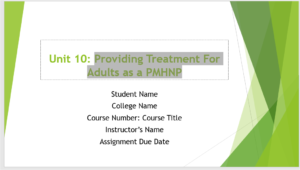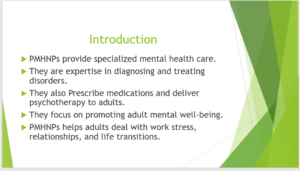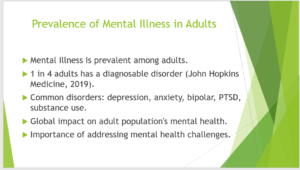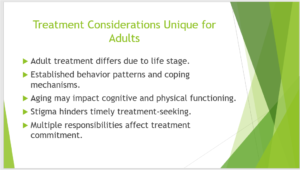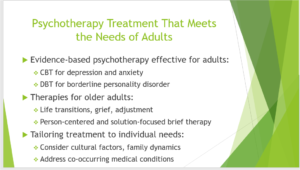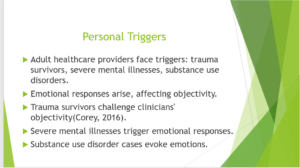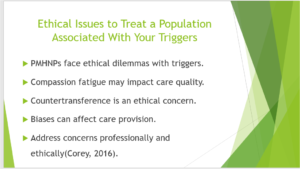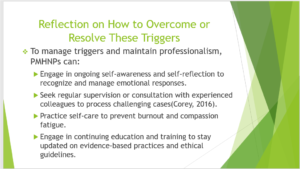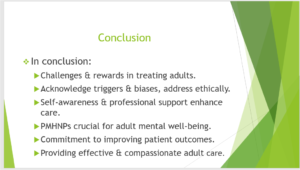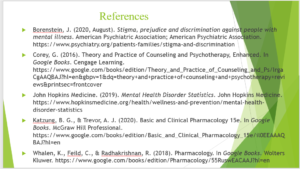Providing Treatment For Adults as a PMHNP
Hello, and welcome to my presentation on a group of persons I am most interested in working with as a PMHNP.
Do you need an original copy of “Providing Treatment For Adults as a PMHNP” ? Our team is ready to help.
In the capacity of a Psychiatric Mental Health Nurse Practitioner (PMHNP), one’s professional obligations encompass the provision of specialized mental health services to individuals spanning various stages of life. PMHNPs, or Psychiatric Mental Health Nurse Practitioners, possess a high level of proficiency in the identification and management of diverse mental health conditions. Their skill set encompasses the ability to diagnose and provide treatment for these disorders, including prescribing appropriate medications and administering psychotherapeutic interventions. They assume a pivotal function in fostering cognitive welfare and providing assistance to individuals in their quest for healing. For the purpose of this presentation, I have elected to concentrate my efforts on the adult demographic within the context of my professional practice. Adults, a demographic cohort typically characterized by individuals who have reached the age of 18 and beyond, encompass a multifaceted and consequential segment of society. Individuals encounter distinctive psychological well-being obstacles as a result of the intricate nature of adulthood, encompassing stressors associated with employment, interpersonal dynamics, fiscal responsibilities, and various transformative life events.
The global landscape is rife with the pervasive challenge of mental illness among the adult population. As per the esteemed institution of Johns Hopkins Medicine, it has been observed that roughly a quarter of the adult population encounters a discernible mental health disorder within the span of a single year (John Hopkins Medicine, 2019). Prevalent mental health conditions that tend to impact individuals within this particular age demographic include depression, anxiety disorders, bipolar disorder, post-traumatic stress disorder (PTSD), and substance use disorders.
The therapeutic approach employed for individuals in the adult demographic diverges from that utilized for other age cohorts, owing to the unique developmental and life stage factors inherent to this particular group. In contrast to their younger counterparts, adults frequently exhibit well-established behavioral patterns and employ coping mechanisms to navigate life’s challenges. Furthermore, it is worth noting that the natural progression of time can give rise to alterations in both cognitive and physical capabilities, thereby requiring customized interventions to address these specific needs. One of the formidable obstacles encountered in adult mental health treatment is the pervasive societal stigma that envelops such issues. This pernicious stigma often engenders a protracted delay in seeking appropriate treatment and fosters a palpable reticence to actively participate in therapeutic interventions (Borenstein, 2020). Moreover, it is imperative to acknowledge that adults are often burdened with a multitude of obligations, encompassing professional pursuits, familial duties, and caregiving responsibilities, all of which can significantly influence their level of dedication towards seeking and adhering to treatment.
Empirical psychotherapeutic methodologies have substantiated their efficacy in addressing psychological ailments among the adult population. Cognitive-behavioral therapy (CBT) is a highly prevalent therapeutic approach employed to effectively tackle the complex issues of depression and anxiety. Its primary objective revolves around the alteration of maladaptive cognitive processes and behavioral patterns, thereby facilitating the amelioration of these psychological conditions. Dialectical Behavior Therapy (DBT) has demonstrated efficacy in treating individuals afflicted with borderline personality disorder and engaging in self-injurious behaviors (Katzung & Trevor, 2020; Whalen et al., 2018). Therapeutic interventions that prioritize life transitions, bereavement, and adaptation challenges have been shown to yield favorable outcomes for individuals in the older adult population. Person-centered therapy and solution-focused brief therapy are both highly esteemed modalities that offer considerable value to individuals in pursuit of interventions that are more temporally limited.It is imperative to customize treatment plans in accordance with the unique requirements and circumstances of every adult patient, as emphasized by Katzung and Trevor (2020) and Whalen et al. (2018). When formulating treatment plans, it is imperative for PMHNPs to conscientiously take into account cultural variables, familial interrelationships, and the concurrent existence of medical ailments.
Healthcare practitioners engaged in the care of the adult demographic may encounter prevalent stimuli, including assisting individuals who have undergone traumatic experiences, those grappling with severe mental ailments, or those who are contending with substance abuse disorders. These circumstances have the potential to elicit affective reactions and test the clinician’s capacity to uphold impartiality(Corey, 2016).
When working with a population associated with their triggers, PMHNPs may face ethical dilemmas. These may encompass sentiments of compassion fatigue, countertransference, and potential biases that could potentially impact the caliber of care rendered (Corey, 2016). It is imperative to acknowledge and discern these ethical quandaries and endeavor to rectify them in a proficient and morally upright manner.
PMHNPs possess the capacity to uphold a commendable level of professionalism and effectively navigate stimuli that may evoke emotional reactions. This is achieved through the diligent practice of continuous self-awareness and introspection, which enables them to regulate and manage their emotional responses in a proficient manner. Engaging in consistent supervision or consultation with seasoned colleagues facilitates the cognitive processing of intricate cases (Corey, 2016). Moreover, diligent engagement in self-care endeavors serves as a proactive measure to avert the perils of burnout and compassion fatigue. Maintaining a current understanding of evidence-based practices and ethical guidelines via ongoing educational pursuits guarantees the provision of care of the utmost quality. These proactive measures enable PMHNPs to deliver efficacious and empathetic mental health services while maintaining a high standard of professionalism in their practice.
The endeavor of regarding the adult populace through the lens of a PMHNP presents a distinctive set of complexities and gratifications. By demonstrating a cognizance of individual stimuli and potential predispositions, as well as actively pursuing ethical avenues to rectify them, PMHNPs are capable of delivering efficacious and empathetic healthcare to their adult clientele. By placing significant emphasis on the intrinsic value of self-awareness and the provision of professional support, one can effectively elevate the caliber of care rendered, thereby fostering a conducive environment for favorable patient outcomes. Through their unwavering dedication to the provision of comprehensive care for the psychological well-being of adult individuals, PMHNPs assume a pivotal position in the enhancement of collective mental wellness within the community.
ORDER A PLAGIARISM-FREE PAPER HERE
We’ll write everything from scratch
Question
What Specific Age Group or Population would you like to treat? Choose one age group or population that is of the most interest to you to treat as a PMHNP in practice. Discuss common issues and treatments involved with this particular age group or population. Then, consider any specific triggers that you have and how ethical issues may arise if your triggers are not resolved. Would you be biased toward that population or someone who is associated with your triggers? What can you do to resolve these issues?

Providing Treatment For Adults as a PMHNP
The population of choice: Adult
Include the following:
Title slide
Introduction to Specific Age Group or Population
Prevalence of Mental Illness in the Specific Age Group or Population
What treatment considerations are unique for the Specific Age Group or Population
Psychotherapy Treatment that meets the needs of this Specific Age Group or Population
Personal Triggers
Ethical Issues to Treat a population associated with your triggers
Reflection on how you can overcome or resolve these triggers
Conclusion
References

